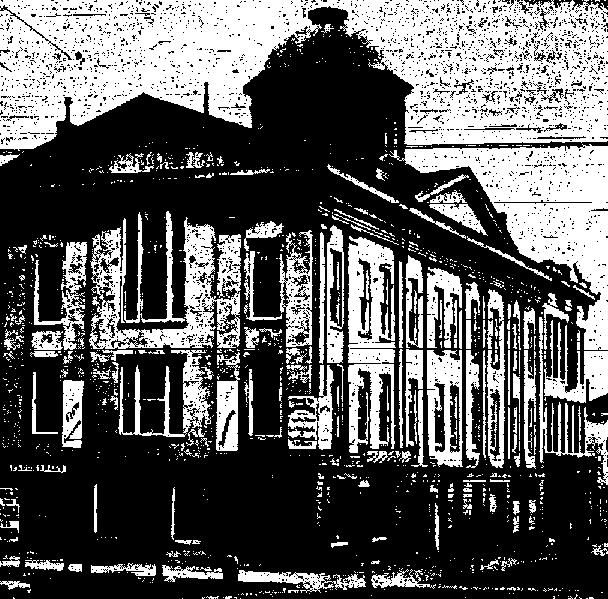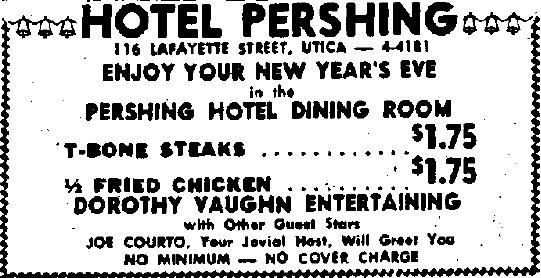|
|
Post by dgriffin on Mar 28, 2009 19:58:26 GMT -5
|
|
|
|
Post by fiona on Mar 29, 2009 9:19:57 GMT -5
Gentlemen, what, pray tell, manner of an implement is this?
|
|
|
|
Post by dgriffin on Mar 29, 2009 11:00:13 GMT -5
You mean the fishing rod? It is used in fly fishing, God's gift from the angels, for the man who loves to stand in the middle of a stream waving a stick.
|
|
|
|
Post by jon hynes on Mar 29, 2009 13:45:49 GMT -5
 OLD MECHANIC'S HALL OLD MECHANIC'S HALLThis photograph appeared first in Batchelor's Pictorial Business Directory, published in 1874-5 by Berk Batchelor. The Directory contained the advertisements of "the leading business men in our prosperous city." The Directory also appeared in different parts of the state. Batchelor, who also conducted an advertising agency, advised those "wishing to advertise away from home" that they could do no better than "to consult with me before doing so." The Directory was loaned to The Sunday O-D by Daniel Batchelor, 138 Elmwood Pl., descendant of the family which included Berk Batchelor. |
|
|
|
Post by jon hynes on Mar 29, 2009 13:47:30 GMT -5
IT'S ROOTS GO DEEP
__________________
Mechanics' Hall:
Culture's Cradle
For Growing City
Civil War Draft Notices
(Ragpicker Was Board?)
Posted on Its Old Walls
By JOE HAHN
________________
|
|
|
|
Post by jon hynes on Mar 29, 2009 13:48:43 GMT -5
Any landmark that had its roots at a time when the city was young makes news at each step in its existence, and each step usually is marked by nostalgia, particularly if the property is remembered as a factor in the city's culture and history.
Reported this summer was the transfer of "Old Mechanics Hall," at Hotel and Liberty Sts., a three story business block at the northwest corner of Hotel and Liberty Sts., in a $65,000 transaction. The transfer was from Mr. and Mrs. Thomas Griffiths, 19 Faxton St. to Sarah Wood West, 6 Millard Ave., Binghamton.
This photograph appeared first in Batchelor's Pictorial Business Directory, published in 1874-5 by Berk Batchelor. The Directory contained the advertisements of "the leading business men in our prosperous city." The Directory also appeared in different parts of the state. Batchelpr, who also conducted an advertising agency, advised those "wishing to advertise away from home" that they could do no better than "to consult with me before doing so." The Directory was loaned to The Sunday O-D by Ganiel Batchelor, 138 Elmwood Pl., descendant of the family which included Berk Batchelor.
At the same time, the 98-year-old printing and publishing business of Thomas J. Griffiths Sons Inc., was taken over by A. Ward West, and is being conducted in the same location. The late Thomas Griffiths purchased the building Sept 30, 1922, from the Utica Sunday Tribune Company, predecessor of the Sunday Observer Dispatch.
|
|
|
|
Post by jon hynes on Mar 29, 2009 13:49:37 GMT -5
The property, more than 100 years old, once the home of The Herald-Dispatch, a forerunner of The Observer Dispatch, has been a draft board center in the Civil War, a telephone center, an opera house, a recreational and cultural center of the Mechanics' Association and its predecessors, the Utica Post Office, for many years, and has served many other business operations.
While some published data and official records were available for this record of the building's history, it has been necessary to rely on the memories of a few of Utica;s senior citizens, especially Frank Werthman and Robert O. Morris, both octogenarians with amazing fine memories of the area, its events, its people and thongs pertinent to the city's history.
Werthman reports that in the Civil War draft, Mechanics' Hall was in the limelight as the place where the names of the draftees were drawn from a hat by a blind ragpicker and were posted outside the building for the populace to inspect. There, the young men of the city learned whether they were being called to the colors for defense of the Union.
The Baxtor Overland Telephone and Telegraph Co., had its exchange at Mechanics' Hall. A cupola or small tower on the roof provided the means of access for the many wires required at that time for the telephone exchange.
|
|
|
|
Post by jon hynes on Mar 29, 2009 13:50:33 GMT -5
An early tenant, according to Werthman, was Joseph Lewis, and later his sons. Joseph and John Louis, and a nephew, Nicholas Louis, locksmiths. A locksmith, Robert J. Miers, continues to operate as one of the tenants of the building.
Through an old directory, it was ascertained that the Young Men's Association of the City of Utica was founded in 1834 "by exertions of several enterprising gentlemen and was subsequently incorporated by the Legislature."
The records show also that the "Young Men's Reading Room and Library occupied a large and beautiful assembly room on the third story of the building." it lists the officers for 1844-5.
In an inspection of a 1837 Utica city directory at the Public Library, Werthman found this reference to the Mechanics' Association: "This institution, through the munificence of the citizens of Utica has, during the last year, been enabled to build a splendid hall at the corner of Hotel and Liberty Sts., where, we trust, the object of the association (Mechanics) will be more fully carried out than heretofore."
|
|
|
|
Post by jon hynes on Mar 29, 2009 13:51:34 GMT -5
The item shows that at the election in 1836, presumably the year in which the hall was built, these officers were elected: President, Gardiner Tracy; firs vice president, J.D. Edwards; Secorn vice president, Rudolph Snyder; Corresponding secretary, James W, Williams, recording secretary; J. J. Francis, and treasurer, James Murdock.
Whertman expressed the opinion that the corresponding secretary was James Watson Williams, after whose benevolent descendants, the Munson-Williams-Proctor Institute takes part of its name.
The third floor became the "opera house" section of the building and was popular at the half-way mark of the century as the center of theatrical presentations, entertainments and most of the city's public functions.
The 1834 directory listed as objects of the Young Men's Association, "promotion of mutual improvement in general knowledge, literature, and sciences and the arts. For the promotion of these objects a reading room was established at which 45 different newspapers and periodicals from various sections were made available."
Books were made available also. In October to May of each year, there were lectures by men of science and education."
|
|
|
|
Post by jon hynes on Mar 29, 2009 13:52:44 GMT -5
"In the winter, a public debating society was maintained, with at least one lecture weekly during the course." The association, presumably the forerunner of the Mechanics' Association, had 200 dues-paying members.
The record adds, "An institution of such usefulness should be liberally sustained."
Named as officers were: President, Bert R. Root; vice presidents, R. U. Shearman and L. H. Eames; corresponding secretary, William C. Johnson; recording secretary, Delos Lake; Treasurer, Mathew D. Bagg.
Managers, R. H. Shearman, James S. Lynch, Julius Dunning, Egbert Bagg, Henry C. Potter, Benjamin Welch J., George Spencer, Francis H. Thomas, John Bryan.
Later records showed existence of the Young Men's Reading Room and Library "occupying a large and beautiful assembly room on the third story of the building."
|
|
|
|
Post by jon hynes on Mar 29, 2009 13:53:59 GMT -5
Listed as officers for the 1844-45 are many names familiar to older Uticans. President John S, Peckham; vice presidents, John J. Francis and Dolphus Bennett; recording secretary, Henry Crandall; corresponding secretary, Thomas Colling; treasurer, James Murdock; directors, Thomas Walker, John Reed, E. S. Barnum, H. Barnard, John Mason, Chauncey Palmer, H. M. Benedict, James Hazlett, Rudolph Snyder, Joseph S. Fuller, James Benton, Stephen Abby, Grove Penny, Levi Cozzens and James Halstead.
Exemplifying the quality of many of the social events to take place at Mechanics' Hall in its heyday, is the still existent invitation to the fourth annual ball of the Young Men's Association (not to be confused with the YMCA which was organized locally much later), held Dec. 22, 1842.
It said, "The honor of the company of (name) is respectfully solicited by the Board of Managers." Listed are the board members, nearly all of whom became outstanding professional and business men and civic leaders in Utica:
Charles H. Doolittle, George S. Dana, Francis Kernan, Luther R Marsh, Dexter Gilmore.
Richard U. Shearsman, Robert T. Hallock, Mathew Murphy, Lester H. Eames, Erastus Clark.
James S. Lynch, Rufus D. Platt, John B. Miller, Thomas M. Owens, Henry W. Rockwell.
James Watson Williams, Huet R. Root, David Hunt, Charles T Hutchinson, Henry H. Williams.
Jon F. Seymour, Daniel J. Francis, William C. Butler, Robert H. Shearman, Ira A. Button.
Eben B. Shearman, E. G. Peckham, C. H. A. Carter, Mathew D. Bagg, George H. Thomas.
|
|
|
|
Post by jon hynes on Mar 29, 2009 13:55:23 GMT -5
The Griffiths printing firm, taken over by West, has been known over the century as producers of fine books, pamphlets and publishers of "Y Drych" a Welsh language newspaper no longer published here.
Other current tenants of the building are Ellis F. Williams, printer; Utica-Mohawk Engraving Co., Charles Steinmayer, veteran barber and the Cunningham Studios.
Records on file in the County Court House show that the property appeared on a map made by Calvin Giteau in 1800, that the property was transferred Apr. 10, 1863, by John and Abigal Camp to the Mechanics' Association of Utica at a consideration of $3,000, and that the building was transferred from the association to Harrison Gilmore's widow, Ida V., May 1, 1873, to the Utica Sunday Tribune Co.
|
|
|
|
Post by jon hynes on Mar 29, 2009 13:56:24 GMT -5
After the Mechanic's Association sold the building, it built the original Utica Opera House on Lafayette St., the site of what was to be the Majestic Theater. The Majestic was closed many years ago and the building was razed to make way for a modern structure where the Pershing Hotel now is located.
Werthman recalls that the late Seymour Latcher remodeled the old Utica Opera House to make it possible for a ground floor theater with balconies, thus eliminating a necessary climb of two flights to the original theater.
Latcher accomplished the changeover within 100 days but not without labor troubles. "I believe Viola Allen was a star of the first play presented when the place opened as the Majestic Theater," said Werthman.
|
|
|
|
Post by jon hynes on Mar 29, 2009 14:08:35 GMT -5
 Hotel Pershing @ 116 Lafayette Street Hotel Pershing @ 116 Lafayette StreetAcross from - Madison La Between Washington St & Seneca St Just West of where Hotel Utica is now.  |
|
|
|
Post by jon hynes on Mar 29, 2009 14:13:04 GMT -5
|
|